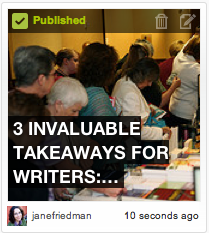Jane Friedman's Blog: Jane Friedman, page 207
August 23, 2011
I Am Always Sincere, But Never Serious
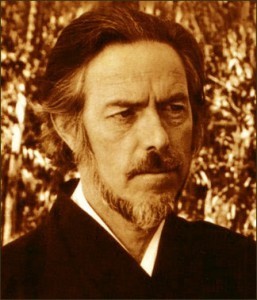
Alan Watts
I am always sincere, but never serious.
—Alan Watts
When I started my first professional blog, I struggled to give it a name. While I thought I could offer helpful information, the truth about writing advice is that it's only helpful if you're the kind of writer who benefits from it. Not all writers do (or can). Plus there are always exceptions to each piece of advice.
That's why I ended up calling the blog There Are No Rules. (I've made an archive of the best posts—click here.)
My hope was that even if people read a lot of my prescriptive advice, the name of the blog itself would offer a meta-commentary—or a wink and a nod—that I'm playing the advice game, and you're allowing me to play the game by listening and granting me some kind of authority.
A personal anecdote: I grew up in a family that didn't crack many jokes. In fact, I was always afraid of people making jokes around me, because I was the sort of person who easily served as the target. (I was the biggest nerd in school.) I hesitate to say I grew up humorless, but it took a while before I knew how to relax. This dynamic still comes into play when I'm among strangers. Since my default is sincerity, especially in unfamiliar situations, I also take everything said as sincere, and sometimes I realize a few seconds too late that what I'm hearing is a joke. There are times when people even have to explicitly state—upon seeing the reaction on my face—"I'm joking."
I'm afraid this can make me very dull at parties. I'm sincere to a fault.
However, I am not serious, and the Alan Watts quote above is one of my very favorites. Every once in a while I like to remind people: Know that I'm sincere, but never serious. Forge your own path; write your own rules.

August 22, 2011
When Mom Was My Age (#42)
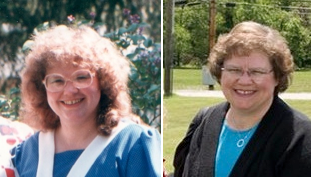
Cheryl Christmas Soper (1988 & 2009)
"When Mom Was My Age" is an interview series between daughters and mothers. New interviews appear every Monday. If you would like to participate, contact Jane.
The following interview is with Cheryl Christmas Soper (age 55), reflecting on her life at age 33, interviewed by daughter Katharine McKinney.
From Katharine
My mother is in many ways my dearest friend, as well as a mirror into my own life. We both married young, had four children (three boys, one girl) and then began to wear different hats as the years went on, developing career aspirations as a way to be creatively fulfilled and help make ends meet. I have always idolized her as a talented woman who is also unfailingly kind and an amazing example of true compassion. While having almost completely opposite personalities, we share a vision for the world and for our families that unites us. I am proud of the sacrifices my mother has made for her family and the fears she has overcome to make her into the independent woman she is today.
Where did you live?
I lived at the same address I live at now, but it was not in the same house. We moved to this address in 1986 to a very old house in not good repair. It was a common house to the area, a shotgun house, so called because all the rooms are in a straight line. You could stand at the front door and shoot a bullet through the back door. Later we tore it down and rebuilt on the property.
What was your typical day like?
I worked in the library system. At the time I was at Central Library in the Technical Services Department doing acquisitions. That's ordering and receiving materials and doing data entry for the accounts.
I would get up and get you kids on the bus to school. I'm sure the bus usually came before I had to be at work. I'm not sure what time I had to be at work. 8:30 maybe? I wasn't driving then so I'd ride the bus.
It didn't matter if I did drive because we only had one car. We didn't get the van until 1990. 1989 was a bad year for cars. I think we had two or three. We had a 1973 Pontiac that had belonged to your great-grandparents. The Pontiac had a oil leak and the engine burned up. Then we bought a 1972 Chevy, and that's the one that got wrecked in 1990. I'd ride the bus or your dad would take me.
My typical day at work usually consisted of working on invoices. We got shipments just about every day. I had to unpack boxes of CDs, videos, I think we were still doing cassettes then. I would put the items on the shelf until they could be processed. Then I would mark on the invoice what branch ordered the material and then I would input that information into our computerized fund accounting.
I'll tell you what, we used to phone in orders. We could order online, but we didn't. Let me just say we almost always phoned in our orders. We would have a stack of 3×5 slips of paper with titles, publisher, ISBN number. We'd phone the vendor give them the ISBN number, then give them the quantity.
I worked until 4:30 every afternoon. Either your dad picked me up, or grandpa would get you kids and pick me up because you kids were staying at my mom and dad's, or I'd take the bus. Then I would cook supper, and then if you kids had homework I would try to get you to do it [laughs]. I would say most of the time we stayed home in the evening and watched TV.
We went to church on Sundays, caught up on stuff that needed to be done around the house on Saturdays. I was at church Sunday morning and Sunday evening and Wednesday evening.
For recreation we did anything that was free—the museum and I remember going to New Harmony. We went to Lincoln Boyhood one time.
How far away was your career change?
I was two years away from my career change. I think I had some vague idea that there were opportunities available because some people I knew were taking Library Science classes at the University of Evansville, actually IU classes. The thought crossed my mind that I might want to take classes someday. At that point I wasn't really thinking about a career change, or a career at all for that matter. It wasn't a career … it was a job. I would say that I probably always hoped I'd come back home, but I didn't really see how I could.
I began to think about changing jobs when we changed the fund accounting system we used at work from one vendor to another. Their system was so clunky and hard to use that it made me want to get out of there. That happened about a year before I actually left that department.
What did you worry about most?
I was always concerned about my family and making ends meet. Just to be able to make enough to keep the family going. At that time your dad made a career change too, a bit later, but at the time he wasn't all that successful. He must have still been with Spectra Computers doing sales training and technical support, mostly sales.
His company was dying and we knew it. He was trying to keep them afloat and help them find better ways to do things, and he did, but it was too little, too late. I worried a lot. Worries about my kids, whether they are doing all right in school, etc.
You were sick a lot. Strep and mono, the flu that almost killed you.
In some ways you came into your own … you were in speech and theater and winning awards. But then you got sick and that was a worry. I used to do that too, be in a play and go gung-ho for 8 weeks and then be sick in bed for a week.
I was furious with the whole gifted and talented program at school. I did not think they often had the right people teaching. Most of them didn't understand G&T, didn't know what it was and didn't know what to do with G&T kids. They were interested in gifted and high-achieving, and that's not the same thing. So I worried about your brothers in that.
What was the church situation? You were very involved in church.
We were going to Beacon at the time, so that was very stressful too because it was a very small congregation, and your dad and I were willing to do stuff—and we did stuff, we did almost everything. Dad was the treasurer, I led the music, we taught Sunday School. Whatever there was to do, we did it. And we weren't really being fed, not just because we were overworked, but maybe some incompatibility with the pastoral style. The pastor was somewhat rigid, old fashioned, black and white. Hillbilly is a good way to describe him. I felt like my children were not appreciated by any members of the church and were seen as a burden. It was a "children should be seen and not heard" kind of church.
Was there family stress?
Any family with four children, there is going to be stress. Even if your kids are good kids, there are going to be squabbles and fights, accusations of not being fair. It's normal but it's still stressful! Refereed all the time.
What did you think the future held for you?
I always had hope for the future. I still do. If we kept on keeping on, we'd change our situation, things would get better. And they did. Our living situation got better. Your dad became self-employed. He found new opportunities to increase his income. As for me I'd almost say the job came to me. [In 1990 Cheryl left Technical Services to become the Assistant Children's Librarian at the new Red Bank Library.]
I didn't go out looking for anything. But a new opportunity presented itself, and I took the chance and went for it. I guess I'm one of those people who is always behind the 8 ball, so I am always thinking about today.
How do you look back at that age now?
33 seems so young, and I did not feel that young when I was 33. I had a lot of responsibility. My kids were 11, 9, 9, and 7. I had you all when I was quite young. The amount of responsibility I had made me feel … not that young. In my head now, I am now at least that young or younger!
I feel like I was clueless. If I knew the things then that I know now, I could have made better choices with all sorts of things, including money and other choices about living. Might have had a better idea of how to live.
From Katharine
This interview with my mother was very revealing to me. I never had any intention of turning out like my mother, but as I see where she was at age 33, and where I am now, I am astounded at the path she forged for me, and the similarities in our emotions. Because of her I am not afraid to do things that seem impossibly frightening.
At age 33, my mother was on the cusp of a new life she was making for herself. In a year's time she would go from being a woman who didn't drive and took a job to help make ends meet to being a woman whose career was opening in front of her.
After working as an assistant children's librarian for several years, she began making a two-hour trip down back roads to Indiana University twice a week to earn a master's degree in library science, which she attained, and with that, a promotion.
Now at age 33, I am taking my career as a writer far more seriously than before, and am making decisions for myself and my family that illustrate that, such as putting my previously homeschooled children into public school to free up some time for writing. I have to wonder what opportunities will break for me, as they did for my mother.

4 generations: Katharine McKinney (holding daughter, Alice), Cheryl Soper, Alice Christmas (2009)
August 19, 2011
Stop Being an "Aspiring" Writer

Banksy in Boston by Chris Devers
Today's guest post is by Ollin Morales from Courage 2 Create. Find out more about Ollin at the end of this post.
Every once in a while I'll come across a blog post that is absolutely brilliant. It's gold. If I was a literary agent or a publisher, I would sign you up in two seconds flat.
But here's the problem: That excellent post is one post in a million of mediocre posts you've buried it under.
That amazing post is also drowning in a blog that has no direction and is lost in a sea of repetition. You have the potential to be great. But you're not delivering on a consistent basis.
Why is that?
You keep aspiring to be great instead of allowing yourself to be great right now. Here's how to move past that mindset.
1. Don't Be Afraid to Put Your Best Self Out There
You're terrified of people stealing your ideas. I get it.
But even if those people out to steal your golden eggs manage to escape copyright laws, guess what? They can never get their hands on the goose that lays them.
You're the goose and you'll never stop producing phenomenal work.
Those bad people who want to steal your ideas, on the other hand, are in a sad shape. Because you'll keep moving on to bigger and better things, no matter who tries to copy you.
Stop holding yourself back. Put your best self out there so your readers and the movers and shakers can notice you.
2. Find Your Target Audience
Once there was a lonely crab who wanted to make friends. This crab saw a school of fish nearby and so he started to act like a fish in the hopes that this would make him more appealing to the fish. But when the school of fish came by the lonely crab, all they saw was a crab acting like a fish. Confused by this, the school of fish passed the lonely crab and left him alone.
Then a group of crabs came by and saw the lonely crab still acting like a fish. This confused the group of crabs, too, and so the group of crabs passed by, and left him in a lonelier position than before.
Stop aspiring and be yourself. Follow your passion. Follow your love.
When you do this, you will attract the people who are passionate about what you are passionate about. You will attract the people who love the things you love. And you won't waste a second on people who are not interested in what you are providing.
3. Create Great Content
Take great content seriously from now on.
Create great content by reading others' blogs. Often they will tell you flat-out what they are struggling with. Provide solutions to their problems; they will appreciate your thoughtfulness.
Create great content by being controversial not for controversy sake, but because you strongly believe in your point of view.
Create great content by writing posts that make you feel slightly uncomfortable. This guarantees that you are writing something fresh, because we only feel uncomfortable when something has not been tried in the mainstream before.
Create great content by experimenting with solutions to common problems you face. Then share your findings with your readers. Create tips and tricks that your readers will not find anywhere else.
Create great content by learning how to write exceptionally.
Create great content by combining all of the above techniques in every post, until it makes your content unforgettable.
4. Build Your Readership
Don't wait for someone else to open up the floodgates to your readership and your fans.
Build your readership by cluster-jumping. Find 5-10 bloggers you adore, click on their blogrolls, follow the people who comment on their blogs, and follow the people who share that bloggers' work—then follow the blogrolls of those people, follow who comments on their blogs, and follow the people who share their work, and continue doing this until you've reached a critical mass. Through exploring that cluster you'll find like-minded individuals who may be interested in what you have to offer.
Build your readership by starting local. Stop waiting for some "big name" authority to follow you. Instead, start guest posting with people in your local network. I started growing my blog simply by guest posting. When I started doing this, I had zero followers, but slowly, I gained momentum. I gained more than 400 subscribers and was featured on big-name blogs like WriteToDone and Problogger.
Be great today by creating a solid readership all on your own.
When you take all the above actions you may find that the power to become great was in your hands all along. No one was stopping you but you.
 Ollin Morales is a writer. Courage 2 Create chronicles the author's journey as he writes his first novel. His blog offers writing advice as well as strategies to deal with life's toughest challenges. As his story unfolds, it becomes more and more clear to Ollin that in order to write a great novel, he must first learn how to live a great life. You can follow him on Twitter and on Facebook.
Ollin Morales is a writer. Courage 2 Create chronicles the author's journey as he writes his first novel. His blog offers writing advice as well as strategies to deal with life's toughest challenges. As his story unfolds, it becomes more and more clear to Ollin that in order to write a great novel, he must first learn how to live a great life. You can follow him on Twitter and on Facebook.

August 18, 2011
Are You Wasting Your Time Trying to Get Published?
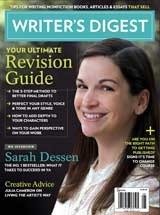
Writer's Digest (July/August 2011)
Don't you wish someone could tell you if you're wasting your time trying to be a writer? Or if you're at all close to getting traditionally published—assuming that's your goal?
In a recent issue of Writer's Digest, I have a feature article, "Revising Your Path to Publication," that attempts to address these (rather) unanswerable questions. It's a helpful article for writers who feel like they're banging their head against the wall. In a nutshell, here's what I advise.
Avoid these 5 time wasters
Submitting manuscripts that aren't your best work.
Self-publishing when no one is listening.
Distributing your work digitally when your audience wants print—or vice versa.
Seeking New York commercial publishing deals for regional or niche work.
Focusing on publishing when you should be writing.
The 2 things I find MOST relevant to your publication path
How much time you've put into writing. Have you put in enough time to get good at it?
How much time you've spent reading quality, published work. This helps you learn how to write better AND understand where you might be on the spectrum of quality.
When is it time to change course?
Honestly assess whether your work is commercially viable. Not all work is.
Are readers responding to something you didn't expect? I see this happen all the time: A writer is working on a manuscript that no one seems interested in, but has fabulous success on some side project.
Are you getting bitter? If you find yourself demonizing people in the publishing industry, taking rejections very personally, feeling as if you're owed something, and/or complaining whenever you get together with other writers, it's time to find the refresh button.
Here's a little piece of hope: If your immediate thought upon reading this blog post headline was something like: I couldn't stop trying even if someone told me to give up, then you're much closer to publication than someone who is easily discouraged. The battle is far more psychological than you might think.
If you'd like to read the full-length article (about 2,500 words), then get the Writer's Digest July/August 2011 issue—either in print or digital form.
Looking for other posts I've written similar to this topic?
You should definitely read this next: 5 Things More Important Than Talent
You Hate Your Writing? That's a Good Sign!
Your Friends and Family Are Wrong
Persistence Doesn't Matter If You Make This Common Mistake
Questions? I'm happy to address them in the comments.
August 17, 2011
Grantwriting 101 for Writers

Hiking path on Inis Meáin (Ireland)
It doesn't occur to most writers that there is "free" money—from government and nonprofit foundations—that is available to support creative projects and professional development. However, it requires writing grants, and it's not a skill or experience that many people have. If it's something you're curious about, here's a primer.
Before You Consider Applying for a Grant
You should be actively writing and publishing. You don't need a remarkable track record, but you can't expect to get money unless you have work to show. Writing can't appear as a pleasant hobby—you should be able to demonstrate it's a serious pursuit.
You should develop a vision for how a grant will benefit you at this point in your career. In her book, The Artist's Guide to Grant Writing , Gigi Rosenberg says, "The grant writing process is a way to find your own answers to the big questions about your next project. … It compels you not only to articulate what kind of art you make but also why and how you make it." Meaning this: Write a grant to better understand where you want to go next, and how you'll get there. That way, if you get rejected, the process will be meaningful in clarifying where you're headed.
Researching Grants
Here are some of the best resources to get started.
Foundation Center
Mira's List
NYFA Source
Your state or regional arts council
Poets & Writers (contests, awards, and grants)
Funds for Writers
Try Google with keywords pertaining to your situation, e.g., "Jewish women grant"
When attempting to get your first grant, (1) start local/regional, which means apply for local/regional arts council grants first, and (2) ask for a small amount. A possible first request might involve asking for several hundred dollars to attend a workshop, retreat, or career-building event.
5 Essentials for a Successful Grant
Be absolutely clear about what you want and why. Your project description should express your goals clearly, describe what your project entails, and what you need to complete it. You should tell a specific story about you and your project, and why it is essential to your career at this moment in time.
Write the grant as if it will happen, and with a positive attitude. You shouldn't write the grant in "hoping" or "trying" mode. Write the grant as if everything you're describing will happen whether you get the money or not. Your grant style and voice should project enthusiasm and confidence, not desperation or neediness.
Provide a detailed and well-researched budget. This can be intimidating if you've never done it before. It's best if you can look at other successful grant budget sheets to understand what a good one looks like. Bottom line: Think through every step of your project, and research/estimate what each step will cost. You often also pay yourself for your time. Reference Gigi Rosenberg's book, The Artist's Guide to Grant Writing , for more detailed information on budget prep.
Show that you have (or that you're seeking) multiple sources of support. Funders don't like to be the only funders. You should demonstrate in your application that you're seeking or have funding from elsewhere, either through other foundations, individual donations, in-kind donations, and/or fundraisers.
Follow instructions—but customize! Many grant proposals do not follow directions. Set yourself apart by following directions to the letter. Also, you might be tempted to use the same project description, artist statement, or resume/bio for each grant proposal. DON'T. You need to customize these sections for each specific grant to have a competitive application.
In Rosenberg's book, author Terry Wolverton describes the writing process like this:
Writing a grant is telling a story. It should have a plot [this is where I am now and this is where I want to go], a protagonist [me, and since the panelists don't know me, I have to create a memorable character], stakes [this is why you should care], and a strong theme [this is the significance it will have in the world].
For more insight, here are a few online posts and articles:
Finding Money for Your Dreams (by Mira at Mira's List)
Interview With Gigi Rosenberg (at Mira's List)
Writing an Artist's Statement
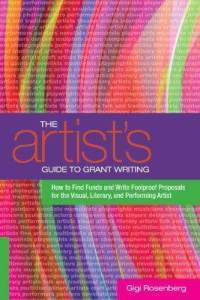
The Artist's Guide to Grant Writing
And—pictured left—you'll find one of the best books I've read on grantwriting, by Gigi Rosenberg. Click here to download an excerpt as a PDF.

August 16, 2011
3 Principles for Facebook Fan Pages
Facebook is the No. 1 most popular website in the United States in terms of visits, which means it's more popular than Google. According to its own stats, Facebook has 750 million users, 50% of which are active on it every day.
This alone makes Facebook an important site when it comes to author marketing and promotion. It would be a mistake to completely ignore it.
On the other hand, how does one use Facebook for meaningful marketing and promotion—especially if you're an individual and not a brand? Here are three principles I've observed working for successful authors.
1. Fan pages work best when you have a content strategy.
The whole point of having a fan page is to stay in people's line of sight—to be visible before, during, and after the launch of formal projects or books.When you post updates, it's like waving to your fans, since your updates appear in your fans' news feeds (unless your fans mute you!). Fan pages make it more likely fans will remember you and spread word of mouth about you and your work.
2. Fan pages work best for authors who have fans seeking them out!
Sure, you can be a complete unknown author with a fan page, but what's the motivation for someone to like your page if they don't know you or your work? Consider what benefit there is, and be able to tout it!
Maybe your friends and family will like your page regardless of what you post, but they're probably already your personal friends on Facebook. Do you really need a fan page to cater to your close circles? You shouldn't!
Fan pages make more sense when you're an author with some name recognition, and/or when you're getting marketing and publicity outside of Facebook, and/or scheduling live events and appearances. Even then, don't expect tons of fans to come flocking (or to pay attention) unless you have something helpful, compelling or entertaining to share.
3. Consider using your personal page to get started.
If you're an unknown name, consider friending your earliest fans or followers through your personal account, and create a specific "list" in Facebook that helps you manage privacy to that list. (For more instructions on this, click here.)
For authors with heavy privacy concerns, this may not be an option, but it's the wisest option for someone who has a reputation that doesn't yet demand "fan" page treatment—or doesn't want the headache of managing two Facebook presences.
How do you know if your reputation deserves "fan" treatment?
If you have to beg people to like your page, you're not there yet.
If you have multiple friend requests every single day from fans/followers, then maybe it's time.
However: Some authors stick with the personal page, such as Christina Katz. Just keep in mind you've got a 5,000-friend cap on a personal profile.
What to avoid on Facebook
Avoid inviting your personal Facebook friends to like or fan your page unless you are shutting down your personal profile. Think about it: Why should your closest circle of friends receive TWO streams of information from you? You should treat your closest circle of friends different from your fans. Always customize your approach depending on your audience.
Do not post self-promotional messages or comments on other people's walls. Epitome of rude.
Do not send private messages to your entire friends list, asking them to market and promote you—or to read your work. This type of message should be personalized and directed toward a select few people.
Do not send a blanket invite to events (where you invite people who couldn't possibly be expected attend, or be interested).
Do not create "fake" events, like "Buy my book!" events. We see what you're doing there, and we're not amused!
Do not create Facebook groups, then add people to those groups without permission, to market and promote your work. (Or for any other reason for that matter. Get permission first or extend invitations.)
Good practices on Facebook
If you use your personal Facebook profile with mixed audiences, it's smart to tag your friends to specific lists so you can adjust the visibility of your updates, or target them to the most appropriate list.
Don't be quiet about having a Facebook profile or fan page. Mention it and link to it from your website, blog—anywhere you're active online. That's how you get fans over time.
Be interesting (share your unique perspectives), be helpful, be open, be charitable—unless not being charitable is your shtick.
Post links to new blog posts, if you're a blogger.
Think carefully about having your Twitter updates automatically appear on Facebook. This can be a huge turn-off for people who aren't Twitter users—and a turn-off even for those who are!
Don't post voraciously—unless that's going to be your shtick. You run the risk of people "muting" you.
Here are the most helpful posts I've read about Facebook marketing. Some of these posts are more geared for businesses/brands, but the lessons often apply for authors, too.
Broad advice
The 7 Biggest Fan Page Marketing Mistakes
Why Most Facebook Marketing Doesn't Work
Facebook World vs. Real Web World
Facebook's advice
Best Practice Guide: Marketing on Facebook
Writer-specific advice
Create a Writer's Profile in Facebook
How a Journalist Engages Fans
What has worked for you on Facebook? Or what's the best advice you've received for using it effectively? Share your experiences or resources in the comments!

August 12, 2011
How Much Has Book Marketing Changed Since 2005?
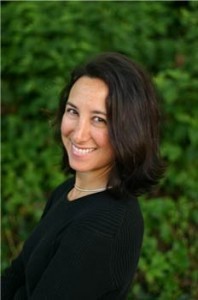
Amy Stolls
Amy Stolls is the author of The Ninth Wife, a novel just released from HarperCollins as a paperback original. The premise: What sane woman would consider becoming any man's ninth wife?
I had the pleasure of meeting Amy in late 2010, before her novel's release, while serving on a panel for the National Endowment for the Arts. (Amy has a fascinating day job as a literature officer at the NEA.)
Amy is smart, witty, and knowledgeable about the writing and publishing world. I was curious about her publishing and marketing experience with The Ninth Wife (her second novel), and how it was different from her first novel (released in 2005 to wide acclaim). Read on for some fabulous insights.
Your first novel came out in 2005, to good reviews, plus it won an award. Your second just came out from HarperCollins. In six years, a LOT has changed in publishing. What has been the biggest surprise during the process the second time around?
You're exactly right. So much has changed.
I had very different experiences with my two novels, but to tell the truth, some of that is due to the books themselves and who published them.
My first novel, Palms to the Ground, was for young adults, published as a hardback by a boutique press that didn't really give it any special marketing treatment beyond what it gave most of its other YA titles.
The Ninth Wife, on the other hand, was published by a large commercial house as a paperback original and was lucky enough to be chosen as one of the publisher's lead titles for the season, meaning they actually put a respectable amount of marketing muscle behind it. To my utter surprise, mind you. Like most of my author friends, I was expecting to have to hire my own publicist or devote a ton of my time to self-promotion.
That said, I was told—hm, let's say urged—by HarperCollins to get my own website up and running by the release date (on my own dime), to set up a Facebook fan page and Twitter account, and be active in the blogosphere.
Nobody at Farrar, Straus and Giroux mentioned any of that to me, of course. Back then, it was all about the reviews. Nail the literary trifecta, it seemed (Kirkus, Publishers Weekly, and for YAs, Library Journal)—check—and you're on your way.
Throw in an award or two—check—even better. I don't recall being urged to do anything on my end, frankly. I set up a local reading for friends, and got lucky with a few school visits, but that's about it.
So what happened?
It sold half its print run and went out of print, never to get into paperback. There are other factors that played a part, of course. I never wrote a sequel (with YAs, that helps with visibility). It was released just before one of the Harry Potter books and even my local Barnes & Noble store got rid of it early on to free up shelf space. (My local independent bookstore, by the way, kept it in its front window and now that store is out of business.)
I also noticed that, though it got good reviews, the reviews weren't always starred. School librarians who have small budgets often go down the list and just order the starred books. I can't blame them.
The point is, my experience with the first book taught me this: getting all or mostly all good reviews doesn't translate into sales.
And from what I hear from all my author friends these days, that's still true today, particularly now that there are fewer venues for reviews.
But here's the good news, and where, I feel, everything has changed between then and now: more and more readers are finding ways to speak up and be heard and create buzz!
Membership on sites like Goodreads—where readers can rate and review books—has exploded, just like the number of bloggers. All hail the folks with daytime jobs and kids and lives outside of literature, but who love to read and have taken to the Internet to share that passion with others through their blogs and Facebook updates and tweets and retweets.
The total explosion of e-books has helped with access, too, but still … I've found many of the reviews from bloggers to be smarter, more thoughtful, more thorough than most of the reviews I'm reading in traditional venues.
Before my second book came out, I thought most of the people who blogged about books—and consequently most of their followers—were book people. You know, in the biz, which meant it was all sort of preaching to the choir, and we authors didn't stand a chance of reaching the casual readers the way, say, book reviews in a general newspaper might attract the general readers.
How wrong I was.
It's great that The Ninth Wife is selling wonderfully in the new blogger landscape! Could you share a little about how you scored blogger coverage?
I think the trick is to send out galleys or early copies to as many of them as you can. That's what HarperCollins did.
They also signed up for what I learned was a blog tour through TLC Book Tours, in which at least 10 bloggers agree to review your book in exchange for free copies. They don't have to be positive reviews, mind you, but at least its guaranteed exposure.
As for my part?
I could have pitched topics for guest blogs on various sites, especially those blogs written by friends. I think that's always a good thing to do, even before the book hits the stores. But what I did do at the suggestion of HarperCollins, and plan on doing more of, is communicate with the bloggers who already reviewed my book. HarperCollins suggested that after a review, I wait a week to let people comment and then write in a thanks and perhaps respond to certain parts of the review itself. The more authors can do that, the more they seem human.
As far as traditional reviews, you mentioned to me that not many have appeared for The Ninth Wife. Why do you think this is?
Yeah … dunno, exactly. Perhaps too much competition for relative unknowns like me during the spring/summer season? Too few venues for reviews? I know what it's like to have a million books arrive at your desk like many editors do. It's overwhelming.And my book's not short, so there's a time commitment there.
But sadly, I do also think it's because it's a paperback original. I really thought we'd come a long way in that regard, but from what I hear … we're not there yet. More of them are being published, that's for sure, and they almost always sell better than hardbacks, mostly because they're cheaper and more attractive to book groups.
But the hardbacks are still more likely to get reviewed.
Tell us how you've been using channels like Goodreads and Facebook.
Of course. Goodreads, well … I'm not actually doing a lot on this site. It's more that I'm glad it exists.
I check in on it, sometimes obsess about the rankings, sometimes read some of the better reviews, but that's about it. (I got good advice from an author friend not to read the one- or two-star reviews, which I thankfully follow. You really can't please everyone!)
I can tell you, though, that HarperCollins did some of its own marketing on the site that really worked, and if individual authors could do the same, it might be worth the effort. After all, it has something like five million members.
For example, folks could sign up to win a free galley—I think HarperCollins gave away 25—and a few thousand people signed up. Obviously, they all didn't win a copy, but it got on their radar, you know?
Then once it was out, HarperCollins ran an ad campaign that apparently did quite well. Said my HarperCollins marketing contact, "Over 4,000 members added the book to their to-read shelf over the course of the campaign, and the ad's click-through-rates were remarkably high—fifty times the industry standard."
Of course it helps to have a good premise or hook to lure people in. I did learn that lesson early on.
Now Facebook—that's where I've been most active. In a way, a Facebook fan page is preaching to the choir, for the only folks who really look you up are already fans.
But to get them to "like" you, and stick with you, and comment on your page, and tell others to look you up, you have to keep your page active. And for me, that often means being funny, giving my "fans" the feeling like they're in the loop, in my inner circle. Which they are, in a way. They "like" me … how can I not like them back?
Also, because I'm so busy, writing the quick one-liner updates fits with my schedule. I should be doing it more often … I'm getting there. Just like I'm working up to using Twitter.
What about readings? Some people say readings are dead. Have you done any? Should anyone do them?
I don't really think readings do the trick for rookie authors like me. They often don't even work well for seasoned authors, unless those authors have a niche following or have reached close to celeb status.
(I'm speaking of novelists here, not poets who sadly reach smaller audiences but make deeper connections with their readers).
I have a good friend—bestselling author of three novels—who e-mailed me totally depressed from the road on her book tour around the Midwest where three or four people were showing up for her readings.
I did a reading in DC—where I live—and it was great. It was a fun, celebratory, necessary event that did sell books and helped spread the word among friends of friends sort of thing.
In fact, a childhood babysitter of mine whom I hadn't seen in decades but lives in the area happened to see a posting of the event (and thankfully the good review in the Washington Post) and came. Shocked the hell out of me!
But I also did a reading in, for example, Winnetka, Illinois, where four people showed up despite all the advertising of the event they did in the Chicago Tribune. The four people were my mother-in-law, her partner, her friend, and my husband's cousin.
Some authors are amazing at drumming up audiences to their own events, and don't mind when hardly anyone shows up, but I haven't heard that readings sell books for the most part. Unless they're at book festivals. Festivals are great for attracting the casual attendee who didn't come for you but could get turned on to your book. Many festivals around the country accept applications from authors to attend.
Might I make another suggestion, though? Why not try and schedule events that aren't readings?
A literary center in my area asked me to do a reading this winter or next spring, long after the book has been out. I wrote back a counteroffer: how about something completely different? How about, for example, a fun Q&A with another author friend of mine, about the writing life, in which we talk about our books but also try to stump each other? That way, it's more fun for us because it's different, more fun for the audience because it's different, and we can cross-pollinate our fan base. I don't know why writers don't do more of this sort of thing.
Fabulous idea! I do hear success stories of authors collaborating on events like this, and offering more of a benefit or angle that goes beyond just "Buy my book!"—something that enlightens or entertains the audience.
You're fortunate to have excellent distribution for your book—it's stocked in all the bookstores of course, but also Target and Costco—plus there have been some innovative ways of getting out there. Sutter Home (the wine company) featured it as a book club selection. (If I ever write and launch a book, I hope a bourbon maker will feature it.) But seriously, how did that happen?
That was HarperCollins's doing. I remember sitting in the marketing meeting and the HarperCollins folks talking about trying to "win" the Target and Costco markets. Very foreign to me … I work in the literary, nonprofit world, so megastores like that and wine companies wouldn't ever have occurred to me.
That said, my mom and mother-in-law have been traveling around the states of New York and Illinois rearranging the stacks at these stores to make my book more visible. I think that's really the key to sales. Hire my mom and mother-in-law.
Let's say you could do this book launch over again. We're six months away from publication. Is there anything you'd do differently? Anything you'd prepare for in advance?
Oh, sure. I'd have embraced Twitter. I'd have been blogging on my website. I'd have gotten the word out better about my willingness to visit book groups. I would have pitched some pieces to major magazines to get my name out there. Most of all, I would have read and reread all of your blog posts. I would totally have had a bestseller on my hands by now.
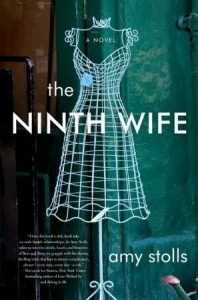
If you haven't heard about
The Ninth Wife
, go check out the Amazon page for many wonderful reviews.
One bestselling author reviewed it and says: "I love this book's deft, fresh take on male-female relationships. As Amy Stolls takes us into the minds, hearts, and histories of Bess and Rory, we grapple with the thorny, thrilling truth that love is always complicated, always—every time, every day—a risk."
Find out more about Amy's work at her website.
Visit Amy Stolls' Facebook fan page for near-daily wit and wisdom that you will love. [Squid poop!]
Last, but not least, check out her cameo appearance in this book trailer from Carolyn Parkhurst.
August 11, 2011
Don't Feel Guilty About "Playing Around" Online

Inside a Buddhist temple in Chiang Mai, Thailand
"The master in the art of living makes little distinction between his work and his play, his labor and his leisure, his mind and his body, his education and his recreation, his love and his religion. He hardly knows which is which. He simply pursues his vision of excellence at whatever he does, leaving others to decide whether he is working or playing. To him he is always doing both."
What's the most common advice you hear at writing conferences? That it all takes a lot of work. That there aren't any shortcuts. That you have to put in the time.
Of course, that's common advice about all types of things in life. People even talk about how much work is required for lasting, romantic relationships.
I don't want to pick an argument with those who defend the value of good, hard work.
However, I would like everyone to stop feeling guilty about the time they spend "playing" online—especially on social media.
Yes, of course it's possible to waste a lot of time on such things. But it's also possible to PLAY and WORK at the same time.
If your play is building stronger connections to other people, opening your mind up to new possibilities, spreading the word about what you do, or helping you understand things about yourself and your writing, then continue to play.
If your play is allowing your mind time to work out difficult problems, giving you an opportunity to recharge, or reducing stress, then continue to play.
If your play is not at all serious or productive, and has no point whatsoever, then continue to play. That is real play, after all. (And sometimes, as Americans, we're just too damn serious and insistent on productivity.)
Caveat: There's a difference between play and escaping from or avoiding things we fear.
Hopefully you know the difference. (Refer to the quote above.)
Don't Feel Guilty About "Playing" Around Online

Inside a Buddhist temple in Chiang Mai, Thailand
"The master in the art of living makes little distinction between his work and his play, his labor and his leisure, his mind and his body, his education and his recreation, his love and his religion. He hardly knows which is which. He simply pursues his vision of excellence at whatever he does, leaving others to decide whether he is working or playing. To him he is always doing both."
What's the most common advice you hear at writing conferences? That it all takes a lot of work. That there aren't any shortcuts. That you have to put in the time.
Of course, that's common advice about all types of things in life. People even talk about how much work is required for lasting, romantic relationships.
I don't want to pick an argument with those who defend the value of good, hard work.
However, I would like everyone to stop feeling guilty about the time they spend "playing" online—especially on social media.
Yes, of course it's possible to waste a lot of time on such things. But it's also possible to PLAY and WORK at the same time.
If your play is building stronger connections to other people, opening your mind up to new possibilities, spreading the word about what you do, or helping you understand things about yourself and your writing, then continue to play.
If your play is allowing your mind time to work out difficult problems, giving you an opportunity to recharge, or reducing stress, then continue to play.
If your play is not at all serious or productive, and has no point whatsoever, then continue to play. That is real play, after all. (And sometimes, as Americans, we're just too damn serious and insistent on productivity.)
Caveat: There's a difference between play and escaping from or avoiding things we fear.
Hopefully you know the difference. (Refer to the quote above.)

August 10, 2011
3 Invaluable Takeaways for Writers: Willamette 2011
I speak at many writing events each year, and I always love to pass on the most useful advice I hear. So I'm starting a series through Storify where I curate and headline some of the best conference advice that I find reported via social media.

Jane Friedman
- Jane Friedman's profile
- 1882 followers



